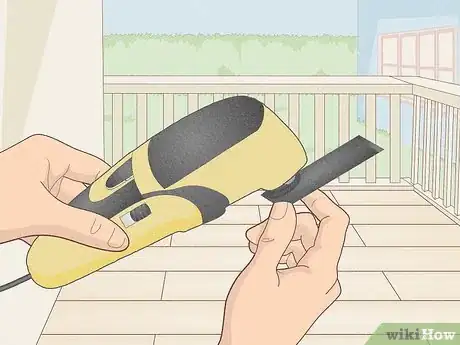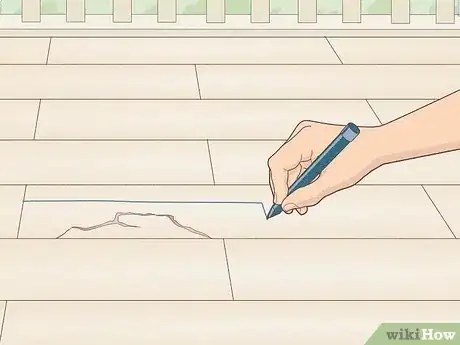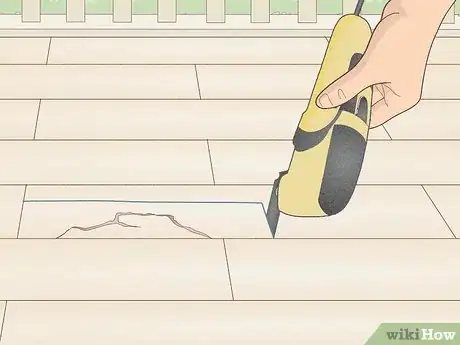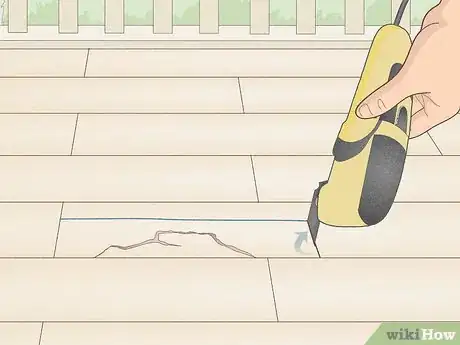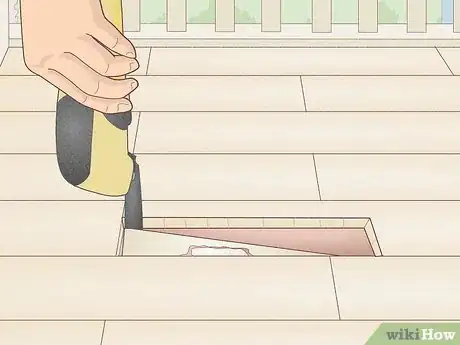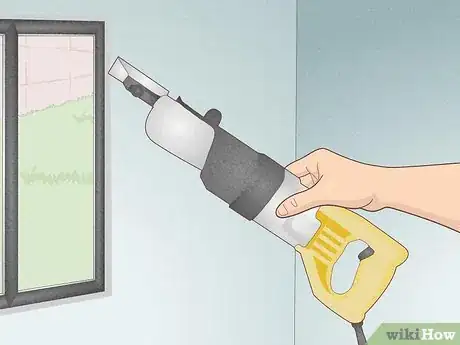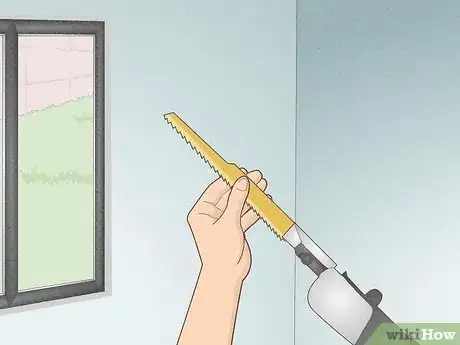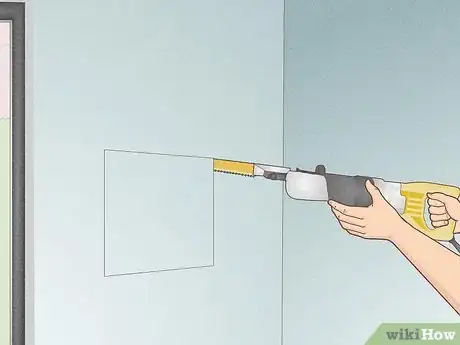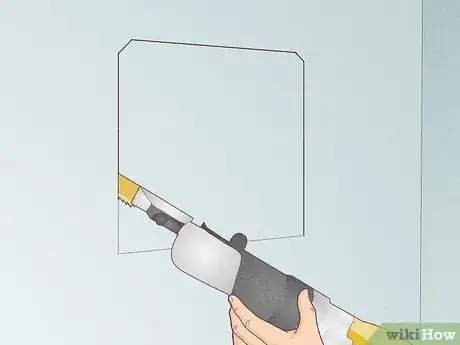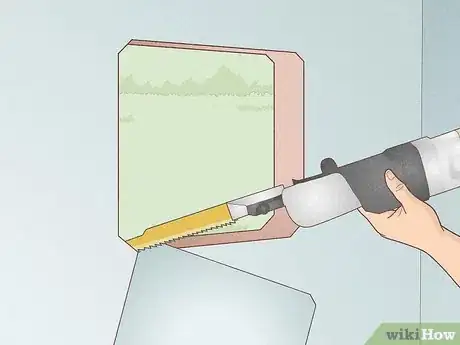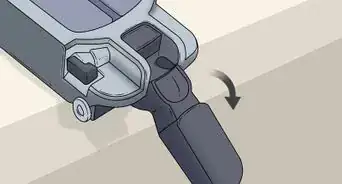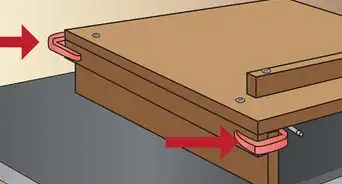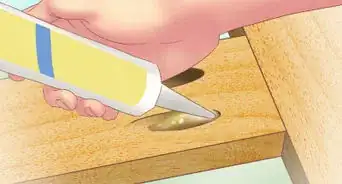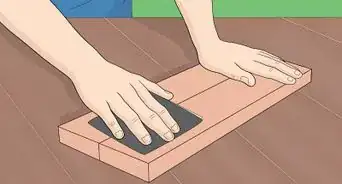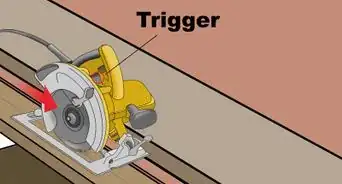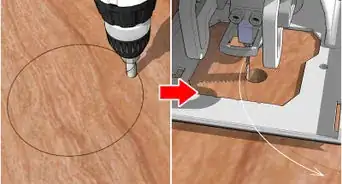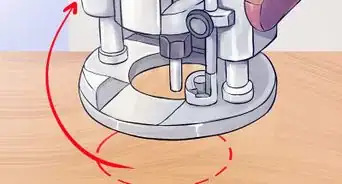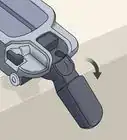This article was co-authored by wikiHow Staff. Our trained team of editors and researchers validate articles for accuracy and comprehensiveness. wikiHow's Content Management Team carefully monitors the work from our editorial staff to ensure that each article is backed by trusted research and meets our high quality standards.
There are 10 references cited in this article, which can be found at the bottom of the page.
This article has been viewed 16,328 times.
Learn more...
When you’re doing remodeling and renovation projects it’s very likely that you’ll find yourself trying to cut wood in tight spaces. With the proper tools, this isn’t half as hard to do as it may seem at first. The trick is using a power tool with an oscillating or reciprocating saw blade. Once you make a couple of cuts with one of these handy tools, you’re sure to feel confident cutting wood in even the closest of quarters!
Steps
Oscillating Multi-Tool
-
1Attach a wood plunge-cut blade to an oscillating multi-tool. Loosen the blade mounting plate bolt with a hex key. Slide the blade underneath the mounting plate, then tighten the plate over it to secure it in place.[1]
- Plunge-cut blades allow you to basically stab the blade into a piece of wood, so you don’t have to slide the saw back and forth or start at an edge.
- Because of the way the blade moves on an oscillating tool, this option is better for making straight cuts. If you want to make curved cuts, try out the reciprocating saw method below!
-
2Mark the outline of the shape you want to cut out on the wood. Use a marker or pencil and a straight edge if necessary. Draw all the cut lines on the surface of the wood.[2]
- For example, if you want to install an electrical outlet in a wooden wall, draw a rectangle the size of the outlet.
Advertisement -
3Turn on the tool and plunge the blade into a cut line. Plug the multi-tool into an electrical outlet, using an extension cord if necessary. Press the trigger to turn the saw on and plunge the blade straight into the wood along one of the cut lines you drew. Apply light pressure and let the tool do most of the work for you.[3]
- With an oscillating plunge blade, it doesn’t matter where you start cutting on the line, so just start wherever it makes the most sense to you.
- Wear safety glasses while you do this to protect your eyes from sawdust.
-
4Pull the blade out and plunge it into another part of the cut line. Retract the tool towards you until the blade comes out of the wood. Line the blade up with another section of the cut line, overlapping your first cut slightly, and push it straight into the wood again.[4]
- For example, if you’re cutting out a rectangle and you made your first cut vertically in the bottom right-hand corner, make your second cut along the same vertical line, but a bit higher.
-
5Repeat the process until you complete your cut. Continue pulling the blade straight out of the wood and plunging it back in along the cut lines you drew, overlapping each cut slightly. Follow the outline of the shape you want to cut out until the piece of wood separates from the rest of the surface.[5]
- For instance, if you’re cutting out a rectangle, make cuts along the whole right side first, then the top edge, then the left side, and finally the bottom.
Reciprocating Saw
-
1Use a reciprocating saw to cut wood during demolition or landscaping. Choose to use a reciprocating saw when you want to cut through things like wood framing, such as when you’re remodeling a space. Use a reciprocating saw to cut through things like tree branches if you’re doing landscaping work.[6]
- For example, a reciprocating saw is great for cutting through a wood-framed wall to install a new window or door.
- You can use a reciprocating saw to make both straight and curved cuts in tight quarters.
-
2Put a demolition blade on the reciprocating saw. Slide the blade into the slot at the head of the saw’s body. Twist the blade lock to secure the blade safely in place. Tug on the blade to be extra sure it’s locked in place and won’t come out when you’re cutting.[7]
- For really tight spaces, a compact, cordless reciprocating saw is a great option that will make your job even easier!
-
3Turn the saw on and poke it into the wood where you want to start cutting. Plug the saw in if it has a power cord and hold down the trigger to start the saw moving back and forth. Hold the saw with both hands and press the blade into the wood while keeping the trigger pressed down.[8]
- Wear safety glasses to protect your eyes from sawdust when you’re using a reciprocating saw. A dust mask is also a good idea, so you don’t breathe in all that sawdust either.
-
4Move the saw through the wood without pulling it out to cut it. Continue to grip the saw firmly with both hands. Pull and push the blade through the wood with the trigger held down to cut in the direction you want. Slowly rotate the saw while you move the blade through the wood if you want to make curved cuts.[9]
- Don’t worry if you’re cutting through wood that has nails or screws in it. The demolition blade can cut through these as well.
-
5Cut through the wood until you remove the section you want to cut out. Continue to drag the blade of the reciprocating saw through the wood. Pull the saw out and press the blade into different sections as needed to cut at different angles until you make all the cuts you want.[10]
- For example, if you’re cutting out a wooden wall stud, cut through the whole the bottom first, then pull the saw out and cut through the top to separate the whole length of the stud from the wall.
Warnings
- Wear safety glasses to protect your eyes from sawdust whenever you’re operating power tools and cutting wood.⧼thumbs_response⧽
- Put on a dust mask when you’re cutting wood in tight, poorly ventilated spaces to avoid breathing in the sawdust.⧼thumbs_response⧽
Things You’ll Need
Oscillating Multi-Tool
- Oscillating multi-tool
- Wood plunge-cut blade
- Hex key
- Extension cord (optional)
- Safety glasses
Reciprocating Saw
- Reciprocating saw
- Demolition blade
- Extension cord (optional)
- Safety glasses
References
- ↑ https://www.plumbermag.com/how-to-articles/tools_power_plumbing_hand/6_plumbing_uses_for_an_oscillating_multi_tool
- ↑ https://www.sgs-engineering.com/help-advice/uses-for-your-oscillating-multi-tool/
- ↑ https://www.youtube.com/watch?t=53&v=Cxou6yLfTaI&feature=youtu.be
- ↑ https://www.youtube.com/watch?t=53&v=cqfZXAnh7As&feature=youtu.be
- ↑ https://www.youtube.com/watch?t=88&v=cqfZXAnh7As&feature=youtu.be
- ↑ https://www.youtube.com/watch?t=8&v=8F2Owjt8Qpw&feature=youtu.be
- ↑ https://www.youtube.com/watch?t=46&v=8F2Owjt8Qpw&feature=youtu.be
- ↑ https://www.youtube.com/watch?t=62&v=1QFzGwnQG2Q&feature=youtu.be
- ↑ https://www.youtube.com/watch?t=171&v=cqmCDdqaqZk&feature=youtu.be
